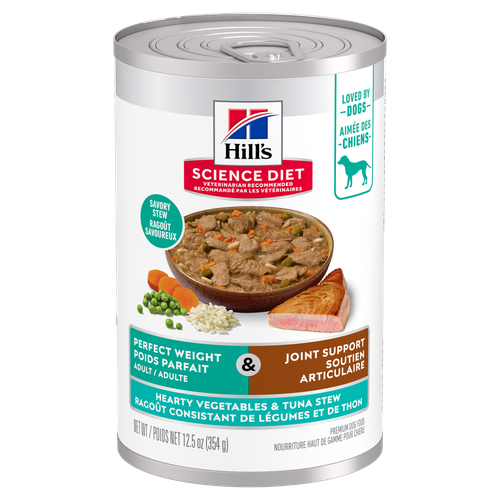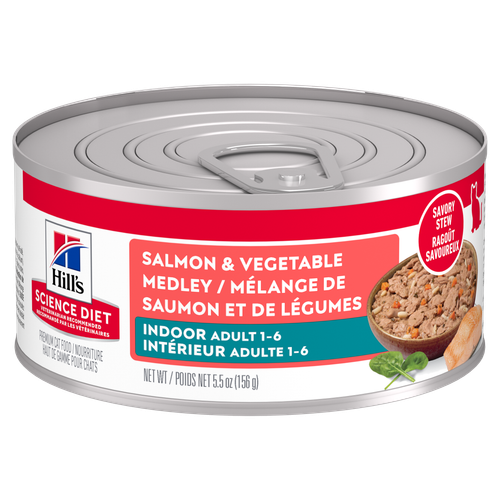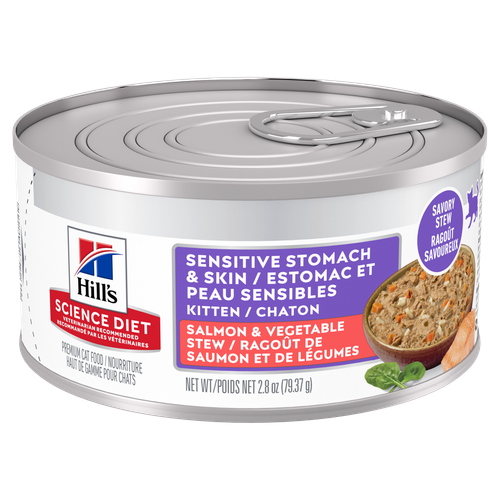
-
Find the right food for your petTake this quiz to see which food may be the best for your furry friend.Find the right food for your petTake this quiz to see which food may be the best for your furry friend.Featured products
 Healthy Cuisine, Adulte, assortiment de conserves
Healthy Cuisine, Adulte, assortiment de conservesHill's Science Diet Healthy Cuisine Variety Pack
Shop Now Sensitive Stomach & Skin, assortiment de conserves
Sensitive Stomach & Skin, assortiment de conservesHill's Science Diet Sensitive Stomach & Skin Variety Pack
Shop Now Adult Perfect Weight & Joint Support Hearty Vegetables and Tuna Stew Dog FoodShop NowFeatured products
Adult Perfect Weight & Joint Support Hearty Vegetables and Tuna Stew Dog FoodShop NowFeatured products Adult Indoor Salmon & Vegetable Medley Cat Food
Adult Indoor Salmon & Vegetable Medley Cat FoodPrecisely balanced nutrition for indoor cats with the delicious taste of savory salmon and vegetables
Shop Now Kitten Sensitive Stomach & Skin Salmon & Vegetable Stew
Kitten Sensitive Stomach & Skin Salmon & Vegetable StewSupports kitten growth, digestive health, nourishes skin and promotes a lustrous fur
Shop Now Adult Urinary Hairball Control Savory Chicken Entrée cat food
Adult Urinary Hairball Control Savory Chicken Entrée cat foodSupports the health of the whole urinary system with optimal levels of magnesium
Shop Now -
Dog
- Dog Tips & Articles
-
Health Category
- Weight
- Food & Environmental Sensitivities
- Urinary
- Digestive
- Joint
- Kidney
- Dental
- Cancer
-
Life Stage
- Puppy Nutrition
- Adult Nutrition
- Senior Nutrition
Cat- Cat Tips & Articles
-
Health Category
- Weight
- Skin & Food Sensitivities
- Urinary
- Digestive
- Kidney
- Dental
- Stress
- Cancer
-
Life Stage
- Kitten Nutrition
- Adult Nutrition
Featured articles Compare Your Pet Food's Calories to Other Brands
Compare Your Pet Food's Calories to Other BrandsCompare Hill's Science Diet dog and cat food's calories against other pet food brands and AAFCO recommended maximum calorie count.
Read More The Incredible Science Behind Your Pet's Microbiome
The Incredible Science Behind Your Pet's MicrobiomeLearn what a pet's microbiome is, how it contributes to your pet's gut & overall health, and why nutrition is important in maintaining healthy microbiomes.
Read More Pet Food Storage Tips
Pet Food Storage TipsDiscover how and where to store your dry, as well as canned, dog and cat food. Learn how to find the "best before" dates on all Hill's pet food packaging.
Read More -


As marijuana becomes more widely accepted in areas across the United States, it's important to store products that contain THC where cats can't get into them.
Mistakes still happen, however, and cats can be accidentally exposed to marijuana. If that happens, you may be wondering, is marijuana toxic to cats and does it have the same effect on cats as it does on people? If your cat ate marijuana, stay calm. Understand the effects of THC on cats, and learn how to help your cat if they're ever exposed to it.
Is Marijuana Toxic to Cats?
Tetrahydrocannabinol (THC) is the main psychoactive compound in marijuana, and it is indeed toxic to cats, though the exact amount that's toxic isn't known. While marijuana intoxication in dogs is more common than in cats (as Acta Veterinaria Scandinavica notes, about 96% of marijuana toxicity cases are dogs) it can still happen, especially with edible THC products. It's also important to remember that THC concentrations tend to be higher in edible products and because they usually flavorful treats, your kitty may be tempted to eat multiple of them. These two factors significantly increase the risk for severe toxicity to occur, particularly when considering a cat's relatively small size because they don't have to consume much to be affected.
In most situations, cats can fully recover from marijuana toxicity without any lingering effects. However, cats who contract aspiration pneumonia, experience seizures or have existing heart problems may develop long-term complications from consuming marijuana.
Side Effects if Your Cat Ate Marijuana
Is marijuana toxic to cats? It is, and consuming THC products can affect your cat in numerous ways.

If your cat ate marijuana, the most common side effects are ataxia (or uncoordinated wobbly movements), extreme lethargy and slower heart rate than normal (the normal heart rate for a cat is 120-140 beats per minute). More severe intoxication can result in the following signs:
- Urinary incontinence
- Seizures
- Drooling
- Dilated pupils
- Breathing slowly
- Twitching
- Agitation
- Excessive vocalization
- Vomiting and diarrhea
- Coma
How to Help a Cat Who Ate Marijuana
Call your veterinarian immediately if your cat ate marijuana, you suspect your cat ate marijuana or your cat is exhibiting the above signs. If your vet isn't available, call the Pet Poison Helpline. When it comes to marijuana intoxication, it's best to take action quickly as a vet can safely remove the drug from your cat's stomach before it's absorbed into the bloodstream. Furthermore, it can take days for marijuana to exit your cat's system, during which they may likely need veterinary support — high doses of THC products, in particular, can be lethal for some cats. Your vet can diagnose marijuana toxicity by examining your cat, running laboratory tests and learning more about your cat's situation from you.


Tasty Tips
Treatment if a Cat Ate Marijuana
Treatment for marijuana toxicity in cats is twofold:
- Detoxification: Removing marijuana from the cat's system is one of the first treatment steps. Your vet will detoxify your cat by administering activated charcoal to absorb marijuana from the stomach and intestines, giving your cat an enema or using fluid therapy to flush the drug out of the bloodstream.
- Supportive care: Supporting the cat until the effects of the THC wear off is the next step, which usually takes a day or two. Since most cats won't eat or drink until the effects have worn off, supportive care can consist of managing their body temperature and fluids to maintain hydration and blood pressure. Your vet may also give your cat medication for seizures or tremors and provide general nursing care, such as dealing with urine and feces, administering anxiety medications (if needed), keeping the cat quiet and preventing self-trauma while they're intoxicated.
With appropriate care, most cats recover fully. Based on your cat's exposure and reaction, your vet will be able to tell you what to expect in regard to short-term and long-term effects.
Now that you know the answer to the question, "Is marijuana toxic to cats?" the best way to protect your cat and any other pets from marijuana toxicity is to store THC products in a locked, elevated cabinet only you have access to. Put all products away when not in use or keep them in your direct line of sight, and you'll reduce your cat's chances of toxicity.


Dr. Sarah Wooten graduated from UC Davis School of Veterinary Medicine in 2002. A member of the American Society of Veterinary Journalists, Dr. Wooten divides her professional time between small animal practice in Greeley, Colorado, public speaking on associate issues, leadership, and client communication, and writing. She enjoys camping with her family, skiing, SCUBA, and participating in triathlons.
Related products

Supports kitten growth, digestive health, nourishes skin and promotes a lustrous fur

Over 70% of cats lost weight within 10 weeks when fed this nutrition

Supports the health of the whole urinary system with optimal levels of magnesium

Precisely balanced nutrition for indoor cats with the delicious taste of savory salmon and vegetables
Related articles

What is the best food for an overweight cat? Learn all about weight control food for cats, including what's in it and how it works.

Discover how to identify cat sensitive skin and what you can do to help your cat thrive from head to paw.

Discover the benefits of Hill's line of kitten foods and how they provide complete and balance nutrition for growing kittens.

When you adopt a cat, you don't just gain a best friend; you also save her life. Here's why getting a cat from a local animal shelter makes so much sense.

Put your cat on a diet without them knowing
Our low calorie formula helps you control your cat's weight. It's packed with high-quality protein for building lean muscles, and made with purposeful ingredients for a flavorful, nutritious meal. Clinically proven antioxidants, Vitamin C+E, help promote a healthy immune system.
Put your cat on a diet without them knowing
Our low calorie formula helps you control your cat's weight. It's packed with high-quality protein for building lean muscles, and made with purposeful ingredients for a flavorful, nutritious meal. Clinically proven antioxidants, Vitamin C+E, help promote a healthy immune system.

